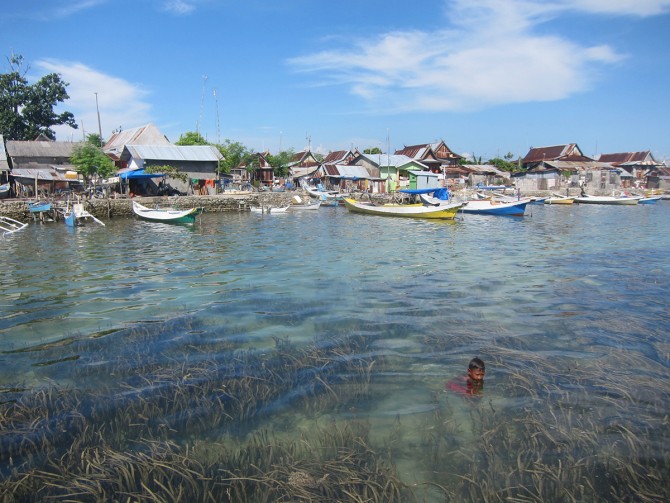
Rachel Bezner Kerr in Malawi.
Cornell’s UN climate author warns of ‘rapidly closing window’
By Blaine Friedlander
In a cautionary tale to the world, the Intergovernmental Panel on Climate Change (IPCC) – a group organized by the United Nations – has issued a 1,024-page report that presents a scientific basis and blueprint to pull humanity back from dire, planet-wide environmental ruin.
The report – “Climate Change 2022: Impacts, Adaptation and Vulnerability,” the second installment of the IPCC’s Sixth Assessment – written by Cornell’s Rachel Bezner Kerr and 270 global colleagues, published Feb. 28. It was compiled by the IPCC’s Working Group II and serves as a guide for international policymakers to safeguard and strengthen nature as a key to a livable future.
“Our report demonstrates that climate change – including increases in climate hazards such as flooding, drought or cyclones – is already affecting food systems, and particularly food security in vulnerable regions,” said Bezner Kerr, professor in the Department of Global Development, part of the College of Agriculture and Life Sciences. “The world can prevent severe impacts on people and on nature, but there is a brief and rapidly closing window to act.”
Bezner Kerr served as one of three coordinating lead authors of the report’s fifth chapter, titled “Food, Fibre and other Ecosystem Products.” The chapter’s other coordinating lead authors are Rodel Lasco of the Philippines and Toshihiro Hasegawa of Japan.
The lengthy chapter confirmed the slowing of agricultural productivity, an increase of deleterious effects on food supply chains, environmental complications underlying food systems, as well as emergent food insecurity and malnutrition around the world – a threat to the global goal of ending hunger. Additionally, the chapter examined forestry, aquaculture, crop and livestock systems, and ocean-based and inland fisheries and improving global social justice to help tackle the scientific problems.
Climate change’s slow-motion events such as sea level rise and ocean acidification affect biodiversity and ecosystems, bringing additional stress.
As an example cited in the report, fishers in Africa’s tropical regions will lose between 3% to 41% of their fisheries’ yield by the end of the century due to fish extinction. Fisheries are a key source of protein for one-third of Africans, and the industry supports about 12.3 million people. Declining fish harvests could make millions of people vulnerable to malnutrition.
While agricultural productivity has improved, in another example, a heated climate will cause global crop and livestock areas to become increasingly unsuitable. Even with low greenhouse gas emissions – that is, if the temperature average remains 1.6 degrees Celsius below pre-industrial average temperature levels – about 8% of the world’s farmland will likely become unsuitable by 2100.
In the Working Group II’s first report, issued last summer, the scientists have agreed that the world’s current average temperature already has risen 1.1 degrees Celsius above pre-industrial average temperature levels – quickly approaching the dangerous 1.5-degree Celsius milepost.
“My message … would be that science shows that the food system is already being dramatically impacted in terms of agricultural productivity,” said Bezner Kerr, a faculty fellow at the Cornell Atkinson Center for Sustainability. “No one is spared, but some groups and regions are much more affected by climate change.”
Low-income countries, small island developing states and the Arctic are among the world’s most vulnerable regions. “But there are disparities in terms of groups of people, and that varies by place,” she said. “Addressing inequities will be an important part of the solution for climate change action.”
Bezner Kerr has been living in Malawi, Africa for over 5 months conducting research while on sabbatical. During the past two weeks, she has worked all hours of the day online with international colleagues to get this report finished. It was voted upon and approved Feb. 26.
“We have a wide range of feasible and effective adaptation options that can help reduce greenhouse gas emissions and risks to the food system,” she said. “For example, ecosystem-based adaptation and agroecology have multiple benefits, particularly when they’re done in an inclusive way.
“When the most vulnerable and marginalized groups within the food system are involved in the planning and implementation of these solutions,” Bezner Kerr said, “they reduce climate risk and provide health and biodiversity benefits.”
Bezner Kerr noted that beyond the scientific researchers and nongovernmental group professionals, delegates from 195 countries participated in the report’s process. “Governments were there, they were present and they were active,” she said. “This demonstrates the hope for international cooperation on this issue, and for taking seriously the science that will give policymakers the tools to act.
“Every action to avoid even small increases in warming will make a tremendous difference,” Bezner Kerr said. “If strong action is taken after this report, there is hope.”
Media Contact
Get Cornell news delivered right to your inbox.
Subscribe

